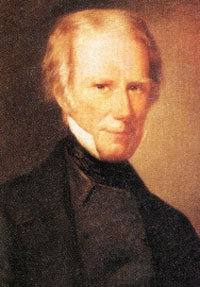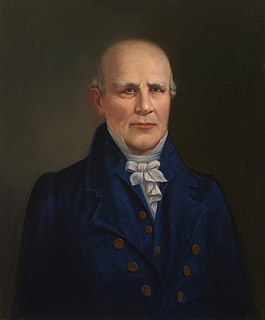On October 17, 1822, Ludwig Worman (F) of Pennsylvania's 7th district died in office. [1] A special election was held to fill the resulting vacancy on December 10, 1822
On October 17, 1822, Ludwig Worman (F) of Pennsylvania's 7th district died in office. [1] A special election was held to fill the resulting vacancy on December 10, 1822
| Candidate | Party | Votes [2] | Percent |
|---|---|---|---|
| Daniel Udree | Democratic-Republican | 1,574 | 51.8% |
| William Witman | Independent Republican | 1,465 | 48.2% |
Udree took his seat on December 23, 1822. [3]

Elections to the United States House of Representatives for the 18th Congress were held at various dates in different states between July 1822 and August 1823 during President James Monroe's second term.

Elections to the United States House of Representatives for the 17th Congress were held at various dates in different states between July 1820 and August 1821 as President James Monroe won reelection unopposed.

Elections to the United States House of Representatives for the 12th Congress were held at various dates in different states between April 1810 and August 1811 during President James Madison's first term.

Elections to the United States House of Representatives for the 11th Congress were held at various dates in different states between April 1808 and May 1809 as James Madison was elected President.

Elections to the United States House of Representatives for the 9th Congress were held at various dates in each state between April 24, 1804 and August 5, 1805. The Congress first met on December 2, 1805. The elections occurred at the same time as President Thomas Jefferson's re-election.

Elections to the United States House of Representatives for the 8th Congress were held at various dates in each state, from April 26, 1802 to December 14, 1803 during Thomas Jefferson's first term in office. It was common in the early years of the United Congress for some states to elect representatives to a Congress after it had already convened. In the case of the 8th Congress, the representatives from New Jersey were only elected after its first meeting on October 17, 1803.

Elections to the United States House of Representatives for the 7th Congress in 1800 and 1801, at the same time as the 1800 presidential election, in which Vice President Thomas Jefferson, a Democratic Republican, defeated incumbent President John Adams, a Federalist.

Elections to the United States House of Representatives for the 6th Congress took place in 1798 and 1799, the earliest in New York in April 1798, and the latest in Tennessee in August 1799, after the official start of the 6th Congress on March 4, 1799, but before the start of the first session of this Congress in Philadelphia on December 2, 1799. It was the last congressional session before the move to the new capital at Washington, D.C..

Elections to the United States House of Representatives for the 4th Congress were held on various dates in each state between August 25, 1794, and September 5, 1795 (Kentucky). The election was held during President George Washington's second term.

A special election was held in Delaware's at-large congressional district on October 1, 1822 to fill a vacancy left by the resignation of Caesar A. Rodney (DR) on January 24, 1822, having been elected to the Senate. This election was held on the same day as the general elections for Congress in Delaware.

The 1822 special election for Maine's 2nd congressional district was to select the successor for Representative Ezekiel Whitman (F), who resigned from his position on June 1, 1822. Mark Harris won the election, and took his seat on December 2, 1822.

On October 13, 1821, before the first meeting of the 17th Congress, Wingfield Bullock (DR) of Kentucky's 8th district died. A special election was held to fill the resulting vacancy.

On December 20, 1820, Jesse Slocumb (DR) of North Carolina's 4th district died. A special election was held to fill the resulting vacancy

On January 14, 1822, Solomon Van Rensselaer (DR) of New York's 9th district resigned to accept a position as Postmaster of Albany. A special election was held February 25–27, 1822.
In 1821, Representative-elect John S. Richards (DR), who'd been elected to represent South Carolina's 9th district, declined to serve. A special election was held to fill the resulting, the first of two special elections in the 9th district for the 17th Congress.
On May 8, 1822, James Blair (DR) of South Carolina's 9th district resigned. A special election was held to fill the resulting vacancy. Blair himself had been elected in a special election earlier in the same Congress.

On May 8, 1822, the last day of the First Session of the 17th Congress, William Milnor (F) of Pennsylvania's 1st district resigned. A special election was held to fill the resulting vacancy on October 1, 1822, a week before the general elections for the 18th Congress.

On May 8, 1822, the last day of the First Session of the 17th Congress, Henry Baldwin (DR) of Pennsylvania's 14th district resigned from Congress. A special election was held on October 1, 1822 to fill the resulting vacancy.

On May 20, 1822, Samuel Moore (DR) of Pennsylvania's 6th district resigned. A special election was held on October 1, 1822 to fill the resulting vacancy